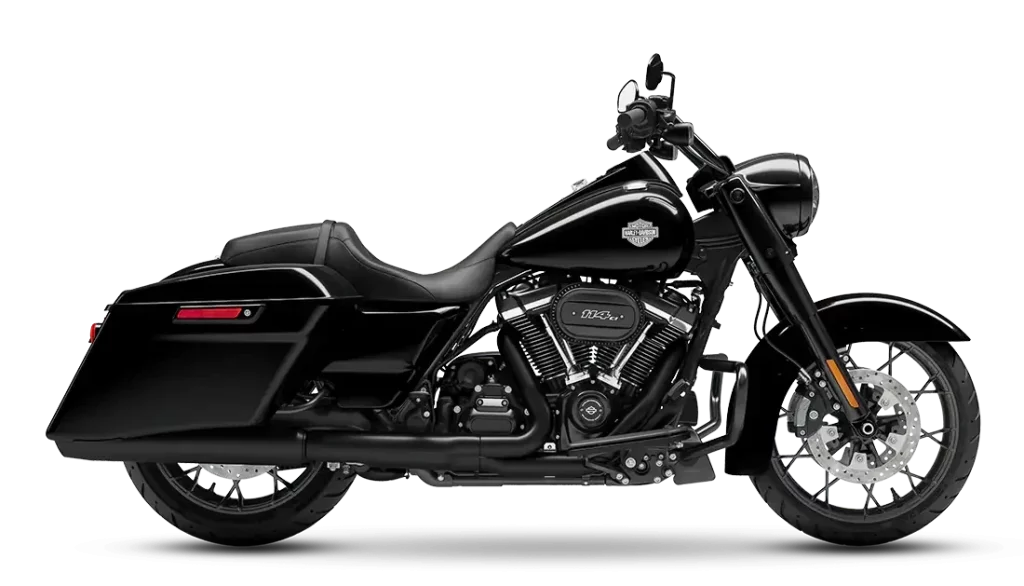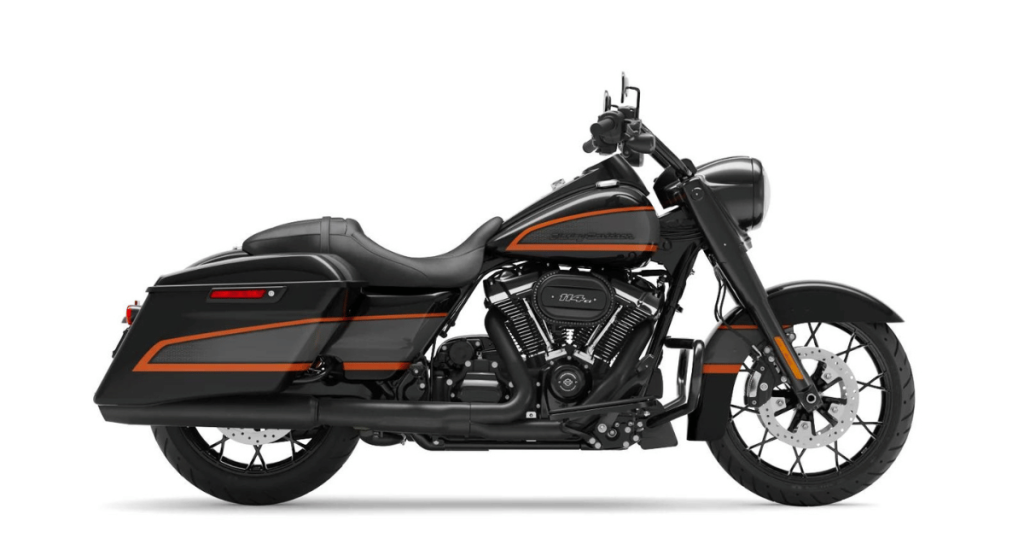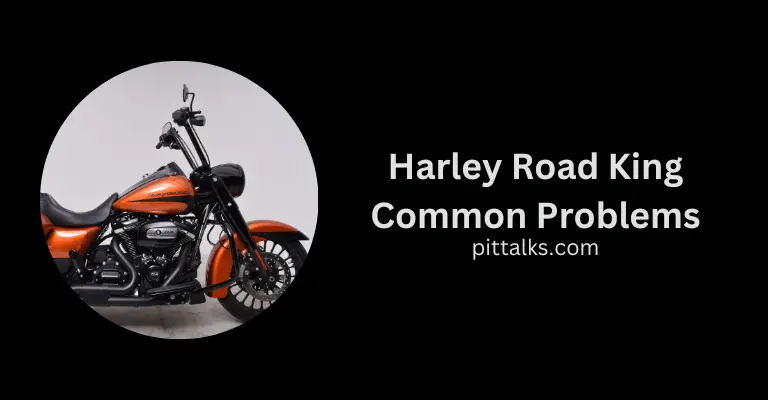Last Updated on January 12, 2024 by Pittalks
The Harley Davidson Road King is an iconic motorcycle, revered for its classic design and superior cruising capabilities. However, like all machines, it isn’t devoid of issues. This comprehensive guide provides an overview of the most common problems associated with the Road King, covering models from the early 2000s to the present. The aim is to arm you with essential knowledge, helping you make informed decisions about purchasing, maintaining, and troubleshooting your Road King.
Understanding Common Road King Problems
Inefficient Windshield
A common concern among Road King owners is the inefficiency of the windshield, particularly for riders taller than 6 feet or shorter than 5’8. The issue isn’t necessarily a design flaw but rather a mismatch between the windshield’s height and the rider’s stature.
Note: Motorcycle windshields work best when they sit at shoulder height on the sides, arching right at the rider’s nose. This design ensures the incoming wind rolls over the rider’s helmet, reducing wind noise and disruptive buffeting.
Loose Windshield Clips
Another prevalent issue relates to the springs or clips that secure the windscreen. These components can vibrate loose due to the substantial vibrations from the Road King’s robust V-Twin engine. This problem is often rectifiable by adjusting the spring clips or replacing them if necessary.
Inaccurate Fuel Gauge
The fuel gauge of the Road King has been criticized for its inaccuracy. Many riders report that their fuel light comes on prematurely, leading them to believe they’re running low on gas even when there’s enough fuel left. This problem is typically due to the faulty fuel gauge sending unit.
Warped Brake Discs
Warped front brake discs are a common problem reported by Road King owners. This issue is identifiable by an inconsistent pulse every time the front brakes are engaged. Regular inspections and prompt replacements can prevent this problem from escalating into a more serious issue, like brake failure.
Vibrating Bolts
The Road King’s heavy engine vibration is a characteristic trait that some riders find less than desirable. The vibrations can be intense enough to loosen bolts, hardware, fasteners, and even engine mounts. Regular maintenance, including checking and tightening all bolts to spec, can help manage this issue.
High-Maintenance Chrome Upkeep
The Road King’s aesthetic appeal largely stems from its generous use of chrome. However, maintaining the chrome’s luster requires regular polishing, which some owners find tedious.
Related: What Year Harleys to Avoid (A Comprehensive Guide)
Year-Specific Road King Problems

General Overview of Years To Come
During the first decade of the 21st century, several Road King models faced issues ranging from faulty fuel systems and defective transmission systems to engine problems and hydraulic issues. Let’s delve deeper into these issues, year by year, to gain a detailed understanding of the problems that plagued these models.
Embarking with the 1998 Road King Problems
The 1998 Road King, part of the Evolution series, often encountered carburetor issues in non-fuel-injected models. Owners also reported electrical system problems and potential oil leaks. Another significant concern was the wear and tear on cam bearings, a prevalent issue in Harley models from this era.
Starting It Off With 1999 Road King Problems
The 1999 model could face issues like carburetor problems in non-fuel-injected models, potential electrical issues, and wear and tear on the cam bearings, which was a common problem in many Harley models of this era.
Detailed Look at 2000 Road King Problems
The 2000 Road King model primarily suffered from fuel system issues, with many owners reporting leaks and unexpected shutdowns.
Unpacking the 2001 Road King Problems
The 2001 model was notorious for producing loud noise while riding—an issue many riders found troublesome.
Analysis of 2002 Road King Problems
The 2002 model was plagued by a significant issue—a faulty fuel system. Riders reported that the bike’s fuel pump was unreliable, often causing the motor to shut down after only a few blocks of riding.
Understanding the 2003 Road King Problems
The 2003 model, despite being a highly anticipated upgrade, fell short of expectations due to a defective fuel system and underperforming engine and motor.
Continuation Of The 2004 Road King Problems
By 2004, Harley-Davidson had mostly switched to fuel injection, but this transition brought its own set of issues such as fuel system problems. There might also be issues with the clutch and transmission, as well as the cam chain tensioner, which was a known issue in many Harley models from around this time.
More Of The Same 2005 Road King Problems
Similar to the 2004 model, the 2005 Road King might have issues with the fuel injection system. Additionally, the cam chain tensioner problems continued to be an issue. Electrical issues, particularly with the ignition system, were also not uncommon.
Still The Cam Chain and 2006 Road King Problems
In 2006, the primary concern continued to be the cam chain tensioner. The introduction of the 88B engine in this year’s models also brought its own set of challenges, including potential overheating issues and oil pressure problems.
Finally Less 2008 Road King Problems
The 2008 model saw improvements, but there were still reports of problems with the six-speed transmission, such as noisy operation or difficulty in shifting. Issues with the electronic control module (ECM) and the throttle-by-wire system were also noted.
The 2009 Road King Problems Are Mostly Gone
By 2009, many of the earlier issues had been addressed, but there were still occasional reports of problems with the electronic throttle control, transmission, and the advanced audio system that was becoming more common in these bikes.
Advancing Forward With 2010 Road King Problems
The 2010 model encountered its own set of problems, particularly with the clutch system. Riders experienced issues ranging from clutch drag to difficulties in disengaging. The electronic throttle control continued to be a concern, with reports of electrical issues affecting ride quality and reliability.
Recent Road King Problems

Past and Present Occurences of The 2011 Road King Problems
In 2011, the Road King’s electronic throttle control system again came under scrutiny due to its inconsistent performance. Additionally, this model year saw issues with the ABS braking system, including sensor malfunctions and braking inconsistencies. Transmission problems, though less common than in previous years, were still noted, particularly regarding gear shifting.
Unraveling 2012 Road King Problems
The 2012 Road King model was a marked improvement over its predecessors. However, like earlier models, it was not without its share of problems. The most common issue related to the motorcycle’s hydraulic system, which failed to deliver the expected performance.
Insights into 2014 Road King Problems
Despite its aesthetic appeal, the 2014 Road King model had its share of issues. Faulty engine parts led to several reported cases of accidents, prompting Harley Davidson to recall some of these motorcycles.
Delving into 2017 Road King Problems
The 2017 model was a significant improvement over previous models. However, as with any machine, it had its share of issues. Some riders reported that the motorcycle’s fuel gauge was inaccurate, often indicating an empty tank even when there was fuel available.
Related: What Year Harleys to Avoid (A Comprehensive Guide)
Prevention and Solutions for Road King Problems
Knowing the common problems associated with Road King models is essential, but it’s equally crucial to understand how to prevent these issues or address them if they occur. Regular maintenance and inspections can help prevent many of the problems associated with these models. In cases where problems do arise, a skilled mechanic familiar with Harley Davidson motorcycles can often provide solutions.
Pros and Cons of Harley Davidson Road King Ownership
Pros
- Long-lasting engine
- Wide range of customization upgrades
- Availability of replacement parts for all year models
- Signature Harley-Davidson charm and V-Twin engine sound
- Industry-leading Harley-Davidson warranty coverage
- Impressive resale value
- Low insurance cost
Cons
- Ineffective windshield for tall/short riders
- Inaccurate fuel gauge
- Warped brake discs
- High maintenance chrome upkeep
- Loud brakes
- Clunky gearbox
- Poor rear suspension
Wrapping Up
While the Harley Davidson Road King is a fantastic motorcycle model, it’s essential to be aware of the potential problems associated with specific years. By understanding these issues, you can make an informed decision when purchasing a Road King, ensuring that you choose a model that will provide you with a reliable and enjoyable riding experience.
Frequently Asked Questions
Which years of Harley Road King are known to have the most issues?
Some Harley Road King models from the early 2000s and 2010s have been reported to have more issues than others. Specific years can vary, and it’s important to check motorcycle forums, customer reviews, and recall information to get a more accurate picture.
What are the common problems reported in the 2003, 2004, and 2014 Road King models?
Common issues for these years include problems with the cam chain tensioner, clutch system complications, electrical issues, and braking system concerns. Riders have also reported excessive vibration and instability at high speeds for these specific model years.
Are the problems with the 2003, 2004, and 2014 Road King models expensive to fix?
Repair costs can vary significantly based on the issue. Some problems might be covered under warranty or recall, while others could require costly parts and labor. Owners should consult a certified Harley-Davidson mechanic for accurate quotes.
Is it worth buying a used 2003, 2004, or 2014 Harley Road King?
While these models have reported issues, a well-maintained motorcycle could still be a good purchase. It’s crucial to check the bike’s maintenance history, conduct a thorough inspection, and possibly consult a certified mechanic before finalizing the purchase.


